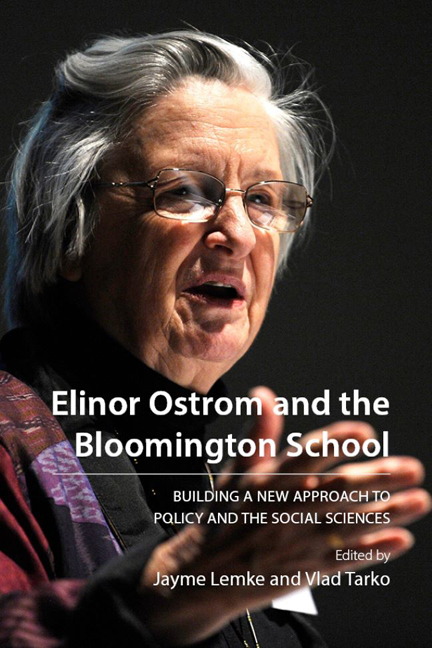Book contents
- Frontmatter
- Contents
- Acknowledgements
- Contributors
- 1 Introduction: the Bloomington school in context
- 2 Public choice theory: reuniting Virginia and Bloomington
- 3 New institutional economics: building from shared foundations
- 4 Elinor Ostrom as behavioral economist
- 5 New economic sociology and the Ostroms: a combined approach
- 6 Foundations of social order: the Ostroms and John Searle
- 7 Environmental policy from a self-governance perspective
- 8 Learning from the socialist calculation debate: is efficiency in public economics possible?
- 9 Public administration from “intellectual crisis” to contemporary “governance theory”
- 10 Rethinking federalism: social order through evolution or design?
- References
- Index
6 - Foundations of social order: the Ostroms and John Searle
Published online by Cambridge University Press: 21 December 2023
- Frontmatter
- Contents
- Acknowledgements
- Contributors
- 1 Introduction: the Bloomington school in context
- 2 Public choice theory: reuniting Virginia and Bloomington
- 3 New institutional economics: building from shared foundations
- 4 Elinor Ostrom as behavioral economist
- 5 New economic sociology and the Ostroms: a combined approach
- 6 Foundations of social order: the Ostroms and John Searle
- 7 Environmental policy from a self-governance perspective
- 8 Learning from the socialist calculation debate: is efficiency in public economics possible?
- 9 Public administration from “intellectual crisis” to contemporary “governance theory”
- 10 Rethinking federalism: social order through evolution or design?
- References
- Index
Summary
The impressive work of Vincent and Elinor Ostrom is commonly regarded as relevant for practitioners of policy analysis and also for more theoretically-minded scholars who are concerned with the functioning of institutional arrangements in small or larger communities. In recent years their accounts of phenomena like polycentricity and co-production came to enjoy a central place in discussions about the nature and the working of government and of contemporary democratic societies.
However, their views and reflections on more abstract, foundational issues – epistemological (what is the structure of scientific inquiry?), ontological (what does the stuff of our social world consist of?) and methodological (in what sense do individualistic assumptions matter?) – are less prominent among scholars who have studied their work. In our view, these issues – particularly questions related to ontology – are of crucial importance for a correct understanding of the Ostroms’ intellectual inheritance. Ontological issues pertain to the very core of all theoretical approaches to social reality and invoke deep philosophical presumptions, of which Vincent and Elinor Ostrom were well aware. Their good acquaintance with the political philosophy of Thomas Hobbes, David Hume and Adam Smith grounded some of the positions they adopted. Other sources of their views can be traced back to American pragmatism (Aligica 2014: ch. 6) and to the comprehensive theoretical conception of politics of Lasswell (Lasswell & Kaplan [1950] 2014). Some different, albeit extremely pertinent insights came from the philosophy of language (Barwise & Perry 1983; Searle 1969, 1995, 2002). Vincent Ostrom was particularly impressed by John Searle's work. He greatly admired Searle's account of the role of language in the constitution of social reality and used it in setting the foundation of his own perspective on it. Having recognized the foundational role of language in the way humans think, communicate, associate, and work with others, he developed his social theory of institutional order as a language-based knowledge process (Aligica & Boettke 2011). Elinor Ostrom (2006) followed Vincent in acknowledging the influence of Searle and elaborated a profound and specific analysis of the way language informs our thought as well as the social reality we live in.
- Type
- Chapter
- Information
- Elinor Ostrom and the Bloomington SchoolBuilding a New Approach to Policy and the Social Sciences, pp. 87 - 104Publisher: Agenda PublishingPrint publication year: 2021



